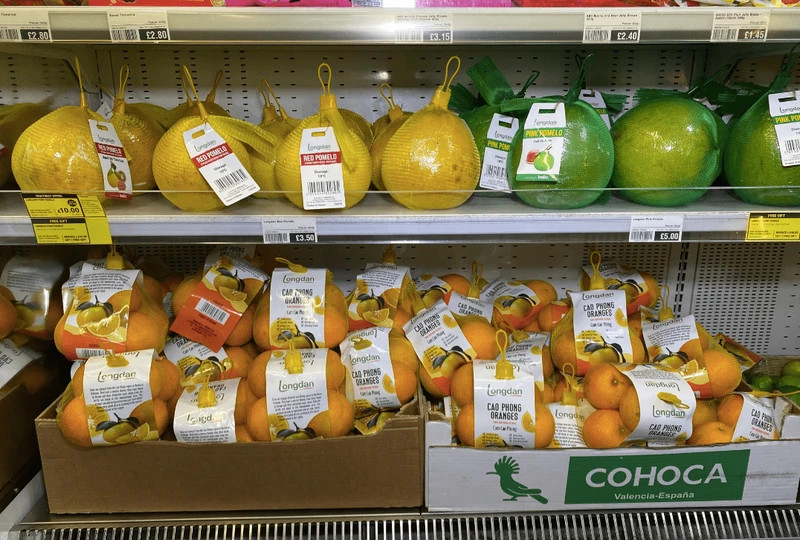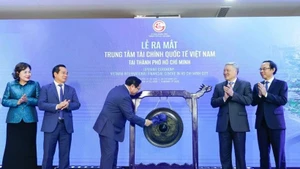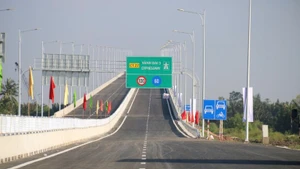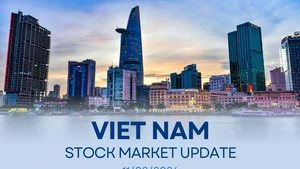Vietnamese agricultural products heading to the UK
In late October, the Department of Agriculture and Rural Development of Tuyen Quang Province, in collaboration with the People’s Committee of Yen Son District and R.Y.B Joint Stock Company, organised the export ceremony of Soi Ha grapefruit (from Yen Son District) to the UK market. Nearly 8,000 Soi Ha grapefruits from Tuyen Quang farmers were exported to the UK, meeting all required standards.
To meet the high standards of the UK market, the Soi Ha grapefruit must have a Brix sweetness level of 11.5 or higher, be juicy, have a uniform yellow colour, be free of blemishes, and show no signs of insect damage. The grapefruit weighs between 1 to 1.2 kg each and undergoes pesticide residue testing two weeks before harvest, with certification meeting European residue standards.
Soi Ha grapefruit is one of the agricultural products recently exported to the UK. About a week earlier, six other products from Tuyen Quang Province were also exported to the UK, including guava tea, honey-pickled papaya flowers from the Binh Minh Organic Agricultural Cooperative, dried bananas from the Chieu Yen Clean Banana Cooperative, green bean tea bags from the Hong Phat Organic Cooperative, and lemon syrup and kumquat syrup from the Minh Thao Agricultural and Medicinal Products Cooperative.
According to the Vietnam Trade Office in the UK, Vietnamese goods have increasingly appeared and gained a strong presence in the UK market in recent years. Since 2021, exports from Vietnam to the UK have been consistently growing.
Hoang Le Hang, First Secretary at the Vietnam Trade Office in the UK (also covering Ireland), said that she is very pleased to see many Vietnamese products, including clothes, shoes, tools, and fruits and vegetables, being sold at major, reputable supermarket chains in the UK.
She added that many Vietnamese products are sold in the UK’s largest supermarket chains, such as Tesco, Sainsbury, Waitrose, and Whole Foods, as well as in supermarkets catering to the Vietnamese and Asian communities.
“Notably, some well-established Vietnamese brands, such as MEET U coffee, L’amant, and Ong Cua ST25 rice, have made their mark in the UK market,” Hoang Le Hang shared.
Nguyen Thanh Huong, Director of R.Y.B Joint Stock Company, which has exported many products to the UK in recent years, said that after conducting surveys and tests, the company highly appreciates the quality of OCOP products, local agricultural products, and regional specialties. The company has introduced and promoted many products from various localities to European markets, a region with stringent regulations on plant quarantine, food safety, and traceability. Overall, Vietnamese products have received positive feedback from European customers.
What should Vietnamese agricultural products be aware of?
Nguyen Canh Cuong, former Trade Attaché at the Vietnam Trade Office in the UK, stated that the Vietnam-UK Free Trade Agreement (UKVFTA) has opened up great opportunities for Vietnamese businesses by eliminating over 99% of tariffs within six years. Sectors such as seafood, textiles, footwear, wood products, and processed agricultural products benefit significantly. For instance, exports of basa fish and frozen shrimp are expected to reach over 30 million USD by 2024, an increase of more than 10%. Products made from natural and sustainable fibres are also gaining popularity with UK consumers.
However, Nguyen Canh Cuong warned that the UK market has strict technical standards, food safety and environmental regulations. Businesses need to prepare carefully to meet these requirements and stand out in the competitive environment, such as improving packaging and applying international standards, like those from the British Standards Institution (BSI) or ISO, to increase competitiveness in this market.
The BSI plays a crucial role in ensuring that products meet the technical, legal, and commercial requirements of the UK market. Products that meet BSI standards are highly regarded for their quality and safety, making it easier to convince UK importers and consumers. Furthermore, BSI certification is widely recognised, helping products reach not only the UK market but also other European markets.
“Businesses should use recycled, biodegradable materials and provide clear information on the product name, ingredients, usage instructions, and origin. Subtle colours and tones are recommended, avoiding bright red and flashy colours to align with the preferences of UK consumers,” Cuong suggested.
In addition, similar to other European markets, the UK market has strict requirements regarding product sustainability. For example, the UK’s laws preventing deforestation and forest degradation could limit exports of wood products, coffee, rubber, vegetable oils, soybeans, leather, and more. Additionally, the UK government is working on legislation establishing the Carbon Border Adjustment Mechanism (CBAM), with carbon taxes set to be applied in the UK from 2027.
Therefore, Vietnamese businesses must prepare suitable strategies for CBAM in the UK and maintain competitiveness in the UK market by evaluating their carbon emissions, implementing carbon-reduction measures, working with low-carbon suppliers, and investing in cleaner technologies.
Despite the challenges, the UK market offers many favourable opportunities that attract Vietnamese businesses to boost exports. The UK is a major global economy with a population of about 68 million people and a high per capita income of 34,632 pounds in 2023. The market also has a diverse population, including over 5.5 million people of Asian descent.
Additionally, the UK’s total import demand is substantial, with an estimated import value of 581.5 billion pounds in 2023. The Vietnamese market has a competitive edge over other markets due to preferential tariffs under trade agreements such as UKVFTA and CPTPP.
Vietnam has a significant advantage in popular products in the UK, especially agricultural products and specialties such as OCOP goods. These are the types of products that Vietnam can push for stronger exports to establish its brand in the UK market.
















